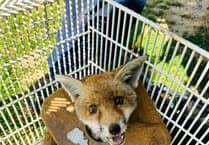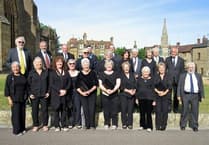Actor Caroline Quentin has just published her first book, and contrary to what many would expect, it is not a memoir about her life in TV and film but about the rather gentler world of gardening. Richard Torne spoke to her from the hidden depths of Devon, where she lives.
“If I stand by this window we should be able to speak!” Caroline Quentin laughs, almost giving up trying to get a good signal.
This was after frantically rescheduling the interview for a second time in what we both assume is yet more damning evidence of Devon’s suspect mobile phone network. “But we’re lucky here, aren’t we?” she adds, quick to point out the county’s more positive charms.
“When I had the opportunity to choose where I was going to live when the girls were little, my husband and I decided to raise them in Devon. Every day I’m grateful to the county, I think it’s one of the most extraordinary and beautiful places.”
Although she is best known for having starred in a raft of TV sitcoms and dramas – most notably the 1990s show Men Behaving Badly – Quentin’s career has taken a new direction and she has published her first book, Drawn to the Garden, which draws on her life-long passion for gardening.
Is this the first in a long line of written works we can expect from her?
“It came about rather by accident, so I’m not entirely sure what’s going to happen next,” she says, revealing that the idea of writing a book came about during lockdown.
“My husband is not into gardening at all, but I would come and tell him what I was doing in the garden during Covid and he said ‘why don’t you tell someone who cares?’, so I started an Instagram account and found that a lot of people do want to talk about gardening.”
The “community” predictably grew and the book was the net result. It’s a disarmingly honest and witty account of her life in the garden, but it also does more than just tell readers how to grow plants and cook vegetables.
In it, she traces her upbringing and the reasons she was attracted to gardening in the first place, well before the pull of acting became irresistible.
“I was interested in nature and growing things probably around the age of five, while I fell into acting at 16-17. It’s been a sort of parallel in my life.”
There is an obvious contrast between the world of acting and gardening, which is essentially a solitary and meditative pastime. To understand this apparent contradiction, one of the book’s many illustrations – drawn by Quentin herself – provides a telling clue.
It depicts her as a somewhat forlorn child, crouching on a patch of grass under threatening clouds and an imposing castle. It’s a deeply poignant sketch that suggests that gardening was more than just a way for her to while away the hours.
“I don’t think I was aware till recently how much I relied on gardening and nature to heal. Even as a child I felt safer being outside, near greenery, birds, nature and staring at snails and bracken, than I did indoors.”
Quentin’s book is also a statement about the importance of encouraging readers to not be afraid of failure. I ask if she approached the acting profession in the same way.
For a moment, she is stumped.
“I’ve got to think about that. Acting is a bit more frightening than gardening because it is so public.
“If you are bad there’s a lot of people waiting to make sure you know about it, whereas as a gardener, you get away with it, even if you’re growing things on window sills or in your own patch at home. There’s something wonderful about that.
“It doesn’t matter if you can’t grow a tomato because if you don’t get it right this year, next year you will have learnt from that experience and have huge success. That’s the lovely thing about gardening – it’s very forgiving as a hobby.
“Oddly, a lot of actors are quite shy people and most need a bit of down time. Even the ones that are more extrovert than I am need time away from that public life.”
Think of gardening and characters such as Alan Titchmarsh and Monty Don instantly spring to mind, but she believes the activity is no longer solely a male domain.
“When I was little all the TV and radio gardeners were men, and it didn’t feel that welcoming to a little girl in the 1960s. Nowadays, there are lots of women on our screens, and particularly on Gardeners’ Question Time we get to hear of Pippa Greenwood and other great women gardeners as well.”
TV producers may already be lining up Quentin as a presenter for a gardening show, I suggest, but she is quick to dismiss that notion.
“In an ideal world I’d love to do that, but the way things are at the moment I’m probably not top of the list of presenters. I think diversity’s the thing now and there are a lot of old people presenting gardening programmes. If I were a TV commissioner I’d be looking for someone younger and more diverse,” she says.
Young or otherwise, Quentin, who – checks notes – first appeared on TV in 1980 in an episode of The Other ’Arf (remember Lorraine Chase?), is still adventurous enough to explore new fields, metaphorically speaking.
Joe Barton’s The Lazarus Project is her first foray into science fiction, a drama that is as far removed from a sitcom as you can get, although Quentin believes she does not have to choose between either genre when great writers like Barton are involved.
“Humour and drama run along beside each other seamlessly, just like in life. Tragedy happens to us all and it can happen in a split second. But by that same token things can be hilariously funny moments after something terrible has happened.
“There aren’t that many that can write that hair’s breadth moment of the human condition where something is both hilarious and heart-breaking, and when it works we all recognise and admire it.”
The tone in her voice suggests that acting provides something that gardening can’t.
So, are there any tasty projects in the pipeline?
“Yes! I’m about to start a massive comedy-drama series for the BBC with lots of wonderful women in it, and I start filming in June.”
No doubt, there’ll be quite a few fans hoping the series will yield more than just one good season.
Caroline Quentin will be giving a talk at Dartington Hall on Saturday, March 9, at the Great Hall, Dartington Trust (Drawn to the Garden: An evening with Caroline Quentin). Tickets £18 or £30 ticket and book.



